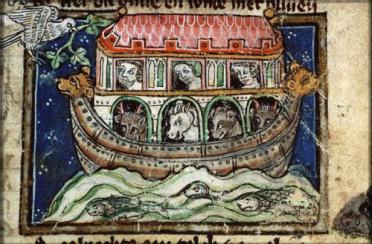Every week, parshaoftheweek.com brings you a rich selection of material on parshat hashavua, the weekly portion traditionally read in synagogues all over the world. Using both classic and contemporary material, we take a look at these portions in a fresh way, relating them to both ancient Jewish concerns as well as cutting-edge modern issues and topics. We also bring you material on the Jewish holidays, as well as insights into life cycle rituals and events...
Parshat Noach is pretty depressing. After a short run, God decides to cancel creation and start all over again, with the one person who behaved himself - Noach, and his family. What terrible things could mankind have been guilty of to elicit such a strong response from God? What was our crime?
The Biblical text is less than completely clear about what was wrong with the world. At the end of Bereshit we have a fairly cryptic story about the Benei Elohim - either angels or big shots, the rich and powerful - who "saw...the daughters of men, that they were good, and took for themselves women from whomever they chose." God disapproves. We are then told that God "saw that the evil of man on the earth was great, and all the desires of the thoughts of his heart are only evil, all day long." The Torah does not give any further specifics, and at that point God decides to destroy all living things, with the exception of Noach. Immediately after this, at the start of our parsha, Noach, the Torah goes over the fact that things had gone wrong, and that God will therefore destroy the world, and then God informs Noach of this decision. In the first section, in which the Torah tells the reader what the reasons were for God's anger, the explanation contains two ideas: ותשחת הארץ and ותמלא הארץ חמס - "the world was corrupted", and "the world was full of robbery (violent theft)." Then, when God informs Noach about the impending catastrophe, only chamas - robbery - is mentioned.
The first concept, corruption, is traditionally understood as something sexual - incest, adultery, there are even some midrashim which accuse the animals of interspecies sex. In some commentaries, including the Talmud, idol worship is also connected to this corruption idea. (The connection between sexual corruption and idol worship is often made, as fertility cults, in which pagan sexual rites were practiced, were common in those days, as they are, in the cult of celebrity, today). The second charge - chamas - is largely understood as theft. These two central charges would seem to connect back to the Benei Elohim story at the end of Bereshit, especially if we understand it as refering to the powerful and wealthy who forcibly took women for themselves.
The obvious question is why, when God finally tells Noach what we already know, that He will destroy the world and save only him, is only robbery mentioned, and the pagan sexual corruption is left out? Rashi, quoting the Talmud in Tractate Sanhedrin, gives a simple answer - "their fate was sealed only because of the sin of theft". Nachmanides (known as the Ramban, Rabbi Moshe ben Nachman, Spain and Israel, 1194-1270) elaborates, explaining that robbery is a well-known, logical prohibition; one does not need any sort of religious tradition to know that it is wrong, it is obviously harmful, spiritually, socially, and materially. That is why the world, ultimately, was punished for this sin, the sin of robbery, the sin they really should have known better than to commit, rather than idolatry or sexual misbehavior, whose ultimate source is religious tradition.
The implications of this distinction are important. The Torah, by telling us that, ultimatelty, it was because of the sin of robbery that the corrupt world was destroyed, and the reason for this is that it is a logical, fair, and humane prohibition, universally understood, establishes a hierarchy of sin. The corruption mentioned in these parshas may be terrible, but the crimes which God ultimately holds us responsible for are those which we ourselves should know better than to commit, the sins which one really can't have a theological or philosophical debate about (maybe some post modernists, or aging Marxists or hippies (remember Abie Hoffman's "Steal This Book"?) out there may disagree, but who cares.) Sins which are sins because a prophetic religious tradition tells us they are should certainly be avoided, but what we see here is a distinction between them and crimes which the tradition didn't invent, but is stricter and more demanding about - actions, like theft, that we all should, and do, know are wrong.
The demands which this hierarchy makes on us are clear: the first thing we need to worry about is how we behave in terms of normative, universally understood, socially accepted right and wrong. The more "religious" demands which our tradition makes of us are important, but not, ultimatelty, what we are held accountable for. It is the harm we do to others, the lying, the stealing, the taking, which should be our ultimate religious concern. Ritual demands are real, they are mentioned here in our parsha, when the Torah tells us what was wrong with the generation of the flood, but they are secondary. Being good to your fellow man, doing right by him or her, not harming others, in ways that we all understand, without any specifically religious motivation, comes first.
Shabbat Shalom,
Rabbi Shimon Felix



Get inspired by Noach Divrei Torah from previous years